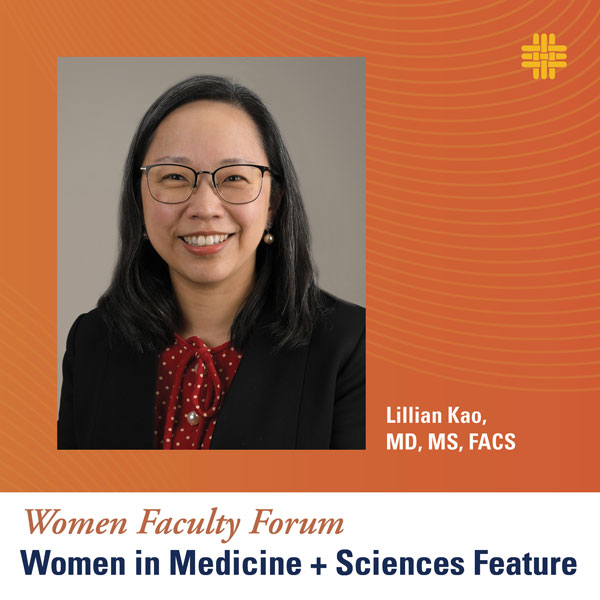Women in Medicine and Sciences Feature: Lillian Kao, MD, MS, FACS
 Each month, the Women Faculty Forum presents its Women in Medicine and Sciences Feature, highlighting the women faculty at McGovern Medical School who are leaders in medicine, research, and education.
Each month, the Women Faculty Forum presents its Women in Medicine and Sciences Feature, highlighting the women faculty at McGovern Medical School who are leaders in medicine, research, and education.
This month’s feature is Lillian Kao, MD, MS, FACS, professor and Jack H. Mayfield, MD, Chair in Surgery, division director of the Division of Acute Care Surgery, and interim division director of Immunology and Organ Transplantation.
What is your background? When did you join UTHealth Houston?
I was born in Chicago – my parents emigrated from Taiwan in the 1960s. After growing up in the Chicago suburbs, I was fortunate to be given the opportunity to be in the charter class of a state-funded, residential high school called the Illinois Mathematics and Science Academy (IMSA), where I was exposed to outstanding role models and received an exceptional education.
I then went on to be accepted by the Integrated Premedical-Medical Program (Inteflex) at the University of Michigan, where I went straight through college and medical school in seven years. After general surgery residence at the University of Washington Medical Center in Seattle, I did a one-year fellowship there in advanced GI surgery.
I started as faculty at UTHealth Houston at LBJ General Hospital in 2002, and I returned to training in 2006 as a surgical critical care fellow (in between being an assistant and associate profess0r). Lastly, as a life-long learner, I also obtained an MS in Clinical Research at UTHealth Houston (2006) and a MBA with a focus in Medical Management at UMass Amherst (2022) while faculty.
What inspired you to pursue a career in science and medicine?
I have always been drawn to math and science, but I also need that human connection that comes from interacting with patients. Surgery is the perfect combination of puzzle-solving, working with my hands, and having the opportunity to greatly improve patients’ lives.
What are your current clinical and/or research interests?
Although I love all of general surgery, my current clinical focus is on acute care surgery to include trauma, burns, and emergency general surgery. Improving outcomes in this field can be challenging. Unlike in elective surgery, the healthcare team does not have the opportunity to optimize patients for surgical intervention up front. This poses a challenge both on a clinical front in caring for these patients, and from a research standpoint in identifying effective, time-sensitive interventions to improve outcomes.
My researcher is focused on evidence-based, personalized surgical care to improve patient-centered outcomes. Highly influence by my mentors here at UTHealth Houston, I seek to promote innovative approaches to perform rapid-cycle learning using real-time data. For example, a current research project seeks to use a point-of-care risk calculator to predict the probability of a surgical site infection at the time of abdominal surgery for trauma and then to tailor prevention strategies based on that risk and other patient characteristics.
Who are your role models?
I have been lucky to have many role models in my life. First and foremost are my parents, whose dedication and commitment to lifelong learning has instilled in me an appreciation for education and hard work.
Here at UTHealth Houston, Dr. Richard Andrassy and Dr. Giuseppe Colasurdo are role models for visionary leadership. Dr. Charles Cox and Dr. Kevin Lally have taught me how basic science, translational, and clinical research can and should be an integral part of both a surgeon’s and a division/department’s day-to-day activities to improve care. Dr. Jon Tyson is an exceptional researcher, mentor, and sponsor, and he has had enormous impact on me and all of my mentees. He has helped me to not only develop my own research capabilities, but also to nurture clinical research expertise in my division and in the department.
Las but not least, I have many peer role models who I came to know early on through the Association for Academic Surgery – Dr. Herb Chen (chair of surgery at UAB), Dr. Melina Kibbe (dean at UVA), Dr. Julie Ann Sosa (chair of surgery at UCSF), and Dr. Tim Pawlik (chair of surgery at Ohio State University) to name a few.
What do you enjoy most about working at UTHealth Houston?
UTHealth Houston is the perfect place to promote a learning health system whereby clinical practice informs research and vice versa. Between the Memorial Hermann and Harris Health Systems, UTHealth Houston is able to serve and have a significant impact on a large and heterogeneous patient population. Having effective partnerships with hospital systems is key to such success.
Additionally, the resources and networking that come with being in the Texas Medical center are second to none. Ultimately, though, I most enjoy the people – collaborating with other like-minded individuals and having the opportunity to train such talented young individuals.
How do you think UTHealth Houston can further support female faculty?
UTHealth Houston has done an excellent job with providing mentors and sponsors, with educational offerings to allow for development along multiple different career tracks (research, education, administrative leadership, etc.), and with resources for success. Since “success” in academia may be different for everyone, it is also important to highlight and support non-traditional paths as well, such as in innovation or in quality improvement activities. Just as patients require individualized care plans that incorporate their values and preferences, faculty too must have personalized career development plans that leverage their strengths and their passions while contributing to the overall missions of the school.
If you would like to nominate a faculty member for the Women in Medicine and Sciences Feature, click here.